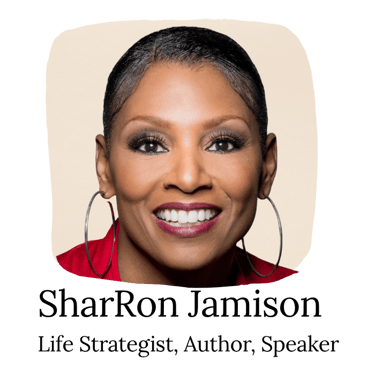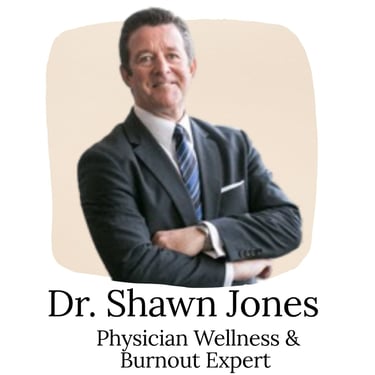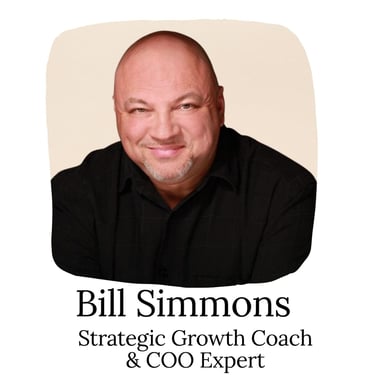Ep 6: Calling in the Justice League
The people who don’t just cheer you on — but guard you. When was the last time someone called you out on your dark side? From the Reflective Space Podcast, hosted and curated by Taniya Hussain
BEFORE YOU WALK AWAY
9 min read



Podcast Guests:
SharRon Jamison - Life Strategist & Entrepreneur / Founder, The Jamison Group / Inspirational Speaker & Minister / Author – I Can Depend on Me, I Have Learned a Few Things / MBA, Biopharma Leader
Dr. Shawn Jones - Board-Certified Otolaryngologist / Past President, Kentucky Medical Association / AMA Delegate & Founder, Physician Wellness Committees / Author – Finding Heart in Art (Burnout Healing)
Bill Simmons - Strategic Growth Coach / Fractional COO & CMO / 30+ Years Scaling Small Businesses / Founder & CEO, Thrive Business Operations / Certified Leadership Consultant (Quran Coach, Taqwa Transformation) / 15‑Year Professional Coach / NLP-Trained Coach
Yes, you've got supervision, you've got tools, but when was the last time someone called you out on your dark side? The impatience, the cynicism, the judgment. We're not just angels in this work. We're angels and devils both.
Today we talk about why owning all of it, especially the messy parts, might be the only way to survive this work — and why we absolutely can't do it alone.
Taniya: "Sometimes you have to be completely broken. You have to let your heart break, however. Painful and difficult and I feel this really very profoundly sometimes, physical pain is hard. It's really hard, and I'm the worst person to be around. It usually goes with some painkillers or even some strong painkillers or, exercise, whatever it goes, but emotional pain. It's when you're on your own. It's so crippling."
SharRon: "I have felt crippled. I have felt caged. I have felt trapped. I have felt as if I was this bubble. I was working a full-time job, building a business, being a single mom, I travel and nothing, it didn't occur to me. Sharon you are sleeping off of four hours. That's not enough. That's not sustainable. It never occurred to me that what I was doing was not normal 'cause it was my norm. And so I would get up in the morning, leave the house at four 30, go catch a flight at six o'clock, go to Florida work, have a business meeting, come back, pick up my son, go to his basketball camp, come home, help him go to work next day. And I would do that. And do that. And do that. And also I have two sick parents. And so I was, but that, remember it became my norm and I didn't realize that what I was doing was beyond human capacity."
When You Don't Know You're Drowning
Shawn: "I have to give a lot of credit to my wife, and I think that's why it's so important to be surrounded by people who care about you and live in community and not be isolated. 'cause I think if I'd been living alone, I probably wouldn't have gone for help, but she really insisted that there was something wrong and I needed. To get some guidance. And when we knew there wasn't anything wrong professionally, that's when I sought the help of a psychologist. And from my perspective, if I had not done something proactive I think it could have easily led to a drug or an alcohol problem or something that would've been much worse for me from a licensure standpoint in the end. So I think getting help earlier is better."
The Importance of Community
SharRon: "But lemme just say this and Tanya, I know that you probably feel the same way. I think it's important that we realize. Everybody, even therapists don't have language around their emotions. I have found a lot of therapists who could not give language to their emotions, and when you can't describe it or pinpoint it, it's trying to hit a bullseye that you can't see. So I think it's so important to try to put some language around it so somebody can walk you through it. And I think that is key. I think because I was able to put some language, even though I couldn't get the emotions, I could say it feels like I feel suffocated. I feels like I'm drowning. I feel sick in my stomach, or it feels like a migraine."
Finding Language for the Unspeakable
The Hidden Toll of Helping
Shawn: "And it isn't even, like you said, just trauma. We see the body broken and in ways that cause most people. To be repulsed. And while we're trained to deal with that, some of that has an effect on us, whether we realize it or not. And then the emotional things we deal with on a daily basis. I think it's important to learn how to unpack a lot of that emotionally."
Taniya: "I think sometimes when you're dealing with that day in, day out, you normalize it. And I think sometimes when you are dealing with trauma, whether that's physical trauma or mental trauma, when you start normalizing something, it gives you a really skewed perspective on reality. It's like social workers, we're constantly dealing with domestic violence, child sexual abuse and then it makes you think. The whole world is dark and you don't see the light and the joy and the happiness and like just having, the nice side of family life."
SharRon: "But I think when you have people in your life, I, who are close to you, they'll be able to identify changes. I have friends who tell me, Sharon, you're not sleeping Sharan, you're gaining weight. Sharan, your hair is coming out. Sharan, you get snappy. Sharon, you are writing, I have a block. Your writing's getting very dark. Why I, they are internal loving stakeholders. They can see patterns and I give them permission to help me understand how they are experiencing me. And because I don't know how people experience me, I think I'm wonderful. I don't know. I'm chopping everybody's head off. So you have to have people in your life to give you some feedback because we all have blind spots and you can only have illumination of your blind spots if you have people who you trust.
Who love you, who are not threatened by you, are jealous of you can tell you when you are misbehaving. We have to be accountable to someone. If you think about people who make the biggest rights in alcoholic's Anonymous or overeat is anonymous, there's some accountability. Somebody has to be given permission to speak into your life. And like you said, there are a mirror, but they have to be a mirror that's not cracked.
Means that I know that AM mirror is cracked if they have not done their own work. I don't allow people to speak into my life if they have never been in therapy. I don't want people speak in my life if they have never had big failure or big tragedy. You cannot speak in my life if you have not been through divorce or dead or devastation, why you don't have the expertise and experience to tell me something that's gonna really help me."
The Mirror That Isn't Cracked
Bill Simmons: "Why is it that we are helpers of people and then we put an unrealistic expectation on ourselves to be perfect. And then we think, and then we feel how can the therapist or how can the business owner be discouraged when they have to be the person that encourages everybody else? And so what I have learned is that authenticity is critical for us to be able to express and be vulnerable. And what I try to say is that I'm a leader among equals. And so I face the same challenges you face. I have discouragement, I have miscommunications. I fear rejection and being misunderstood. I'm concerned about my finances."
Bill Simmons: "cause when you're a helper we have a lot of social workers. Therapists, servers of other people on watching this when you are serving and helping other people, we are sometimes the worst at helping, asking for help from other people."
Taniya: "Oh God. Yeah. Te tell me about it. It's, it feels so. Shameful. Embarrassing very, what's the word? Painful. 'cause you feel that everybody's judging you and you feel like such a failure."
The Perfectionism Trap
SharRon: "Was it easy to accept the help after being the help for so long? To me it was easy 'cause I was tired. I needed a rescue. I needed I call it emotional rehab. I needed rest, so I felt like I wanted my mommy. You know how you like, oh, I want my mommy. That's how I felt. I felt so overwhelmed. I felt that I wanted somebody to take care of me, not in a way that they took care of my bills, but I needed to rest. And then when I was going through that depression state, I slept a lot and I thought it was just emotional, but I realized I was tired.
You don't know, because again, it was slow. And so now when I needed help. So not only did I get a therapist, I got a maid, I got a organizer, I got a cook. I brought in all the work"
Wanting Your Mommy
SharRon: "so I needed help. I accepted help and I was very, intentional, because this is a problem with somebody like me and you, Tanya we know the school, we know the tools, so I had to get out. I was analyzing them and judging them at the same time. I didn't know that I was doing it. I'm thinking like, she didn't ask me a follow-up question and he wasn't thorough. So I found myself judging their ability to counsel me. Does that make sense? And so after I, I got over myself and realized Sharon, be the patient, doctors can't heal themselves. And then I was able to let go."
Bill Simmons: "Every time it was really about surrender, right? That we give in to the experience we're having because I think anybody who. Really attempts to help other people. There's a little bit of a recovering control freak inside of all of us, right? And we really have to learn that life is not manageable on our own terms. That when to serve at our best really means to let go, right?"
Taniya: "Let go. I that's the highlight for me in this interview, really the importance of letting go and getting out of your own way. A lot of the time, because we are Are very good at what we do, but we so bad at looking after ourselves. Some of us are so bad at being kind ourselves. Good enough. What you just did, you need to work harder."
Getting Out of Your Own Way
Bill Simmons: "My wife is. A blessing to me from the fact that sometimes my dark times actually brought crisis into our marriage. But she has been very patient with me and. Said, you help so many people, you have to be willing to let other people help you. And so I think you have to have other people around you. For me, it was my wife and I was lucky to have that. And then other close people that were willing to help me."
Shawn: "Yeah. I think some way, shape or form, you have to make a human connection. And it doesn't have to be a sister, a brother, a mother, a father, a spouse. Although those are all wonderful. It could be a colleague that you feel like is trusted, a good friend. But you've got to have someone you feel like you can go to and be real with. And I think part of this process is about telling the truth of our interior environment. What makes me sad, what makes me feel hurt, what makes me angry, what makes me glad and being able to be honest about that with someone and then as a result of telling the truth of your experience, which is a reflection of who you are the process of doing that is a very healthy process and trusting that process allows you, I think, to do a lot of healing."
The People Who See All of You
Taniya: "Keep, yeah keep you together, keep you human, keep you, I know that the colleagues that I have, within my social work team is a multidisciplinary team. We have a nurse, we have a we psychologist, we have social workers, we have youth workers. I think that's probably why I have stayed in that, particular team for 21 years because it is like a community. They're not just work colleagues. They're there for you when you are feeling, sometimes really traumatized by a young person that's been demonized and marginalized when even other professionals are seeing him as this awful evil person and you are just seeing him as a child and I can go to my colleague and actually just sometimes cry."
The Team That Keeps You Human
The raw truth: What stays with you today isn't about techniques. It's the raw moments. Sharon, admitting "I wanted my mommy." Sean's wife, refusing to let him fade away. Teams of 21 years who've seen you cry over kids the world gave up on.
We are angels and devils. The people who truly love us see both. They name our cynicism, our blind spots — not to shame us, but to keep us whole. We teach healing every day, but we forget: real healing begins when someone sees all of you, helper and human, light and shadow, and stays.
So find your people, the ones who notice when your writing gets dark, who see when you're not sleeping. Who make space for both your angels and devils. Because the darkness isn't the danger. Facing it alone is.
Next episode: How your self-care routine might actually be exhausting you — when wellness becomes just another thing you have to perform perfectly.
Subscribe at dancingwithdarknessbook.com
Dancing With Darkness
A transformative journey from darkness to light.
© 2025. All rights reserved.